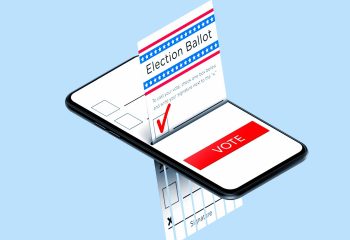
Americans feel informed about presidential election – but are lukewarm on media coverage
More than eight in 10 Americans believe the news source they use most often is doing an “excellent” or “good” job of covering the election, but generally give mediocre ratings to election coverage from national and local television, newspapers and radio, more generally. Americans say the news media in general give insufficient attention to election issues and candidate qualifications for office. Many also harbor doubts about the accuracy of election information from the national news media and, especially, major internet companies. They are much more confident in the accuracy of election information from local news sources.
Despite concerns with election coverage, Americans are highly confident they have the information they need to make informed decisions about voting in the presidential election. However, they are less likely to feel confident about being well-informed on Congressional, state and local elections.
These results are the latest in Gallup and Knight Foundation’s Trust, Media and Democracy series, summarizing results from two nationally representative surveys of more than 1,200 U.S. adults conducted Sept. 11-24 and Sept. 24-Oct. 5.
Americans mostly give middling ratings for media coverage of the election
Roughly half of Americans give positive ratings of the election coverage being offered by national network news, national cable TV news, local TV news, radio and national and local newspapers. They are much more positive about coverage from the news source they use most often (83% rate it as either “excellent” or “good”), but they are highly critical of coverage they see on major internet companies’ platforms (3% “excellent” or 18% “good”).
The survey also asked respondents to rate each of these news media types on three specific aspects of election coverage — the accuracy of statements and proposals made by candidates, the “top issue concerns of people like you,” and the voting process. In general, respondents rated the media less positively on these specific aspects of election coverage than they did for their election coverage overall. However, Americans make little distinction in their ratings of the media in these three areas. For example, 32% rated national cable TV news positively for coverage of candidate statements and proposals, 35% rated it positively for its coverage of voters’ top issue concerns, and 35% rated its coverage of the election process positively.
Americans are concerned about accuracy of election information from non-local sources; think election issue coverage lacking
Less than half of Americans are “very” (8%) or “somewhat” (37%) confident that the national news media will provide accurate information during the election campaign this year. That leaves a majority either “not very confident” (26%) or “not confident at all” (28%). These figures are similar to Americans’ trust in the news media in general.
Though the public lacks confidence in the news media, Americans are much more critical of major internet companies, with only 20% confident they will provide accurate election information.
In contrast, many more Americans, 67%, are confident that news media in their local area will provide them with accurate election information. The differences in confidence levels between national news media, local news media and major internet companies are common across evaluations of various types of news media. That is, local news media is trusted more than national news media, while online information is trusted less.
As is typically seen in public opinion data about the news media, partisans diverge in their opinions, with 16% of Republicans and 76% of Democrats confident in the national news media to provide accurate election information. One in three independents are confident.
All the party groups are more confident in the accuracy of election information from local news, something 49% of Republicans, 61% of independents and 85% of Democrats express.
Confidence in the accuracy of political information from major internet companies ranges from 9% among Republicans to 32% among Democrats, with 17% of independents saying they are confident.
Many Americans believe the news media devotes too much election coverage to polls (51%) and controversial statements and actions from a candidate’s past (42%). But even more U.S. adults are critical of the media for spending too little time on the issues that matter most to voters (64%), the policy proposals of candidates and political parties (64%) and the candidates’ qualifications for office (62%). A slim majority also believes the media devotes too little coverage to the fairness of the voting process and election outcome (54%). Americans are generally content with media coverage of major campaign events such as debates or conventions — 58% say the media devote the “right amount” of coverage to such events.
Majority getting election news primarily online; TV news organizations most common source
Nearly six in 10 U.S. adults, 59%, indicate they are following news about the 2020 election “very” closely, with another 28% saying they are following it “somewhat” closely. Nearly half, 47% say they are paying the same amount of attention to this year’s election as they did to the 2016 election, while 39% are paying more attention and 14% less attention than they did four years ago.
The majority of Americans, 58%, say they get most of their news about elections online using a computer, smartphone or app. Thirty percent primarily get their election information from television, with smaller proportions relying on radio (8%) or printed publications (3%). Eighty-seven percent of adults under age 35 mostly get election-related news online, while 55% of adults 55 years of age and older primarily get it from television.
Regardless of whether Americans get their election news online, on television or from another method, nearly half, 49%, say they rely on information from television news organizations for election information on a daily basis. Social media websites and apps are the second most common source, with 42% relying on those daily for election news. Slightly less than one-third rely on news organizations affiliated with a newspaper, online-only news website or radio station each day for political news.
Americans who rely on television for election news are more inclined to use national stations (39%) than local ones (15%), but substantial proportions say they use both about equally (32%). Cable TV news organizations are the primary source of news for 31% of Americans, while 14% say they primarily rely on news from network TV news organizations, and 25% use both about equally.
Those who rely on newspapers as an election information source divide about equally between relying primarily on a local newspaper, a national newspaper or both.
Despite concerns, most Americans are confident they have the information needed to make informed decisions
More than three-quarters of U.S. adults say they are “very” confident they have the information they need to make informed decisions about the presidential election (77%) and where and how to vote (79%). This confidence may stem from the high ratings they give to their primary source of politics and election news.
At the same time, Americans express less confidence about being well-informed for Congressional (53%) and local elections (35%). Forty-five percent are very confident they have the information they need to make informed decisions about state office elections (state legislature and governor). Their lesser confidence in being informed about sub-national elections may result from the limited news available on those contests and possibly a decline in the number of local news organizations operating in the U.S. Still, majorities are at least “somewhat” confident they are well-informed about local and national elections.
By a two-to-one margin, Americans say the current political information environment makes it hard to be informed
Sixty-eight percent of Americans say the amount of information available about politics and elections makes it hard to be well-informed “because there are many sources of information that need to be sorted through to determine what is true or important.” Thirty-two percent take the opposing view, saying it is easy to be well-informed “because there are many sources of information that are easily accessed through digital technologies.”
When people feel overwhelmed by political and election information, they take different approaches to addressing it. Asked which of four possible ways they are most likely to respond when feeling overwhelmed, Americans divide evenly between three — limiting the number of sources they rely on to just one or two, consulting a wide variety of sources to see where they agree on facts, or taking a break from election and political news. Relatively few (4%) turn to friends or family members for guidance when they feel overwhelmed, while one in five U.S. adults indicate they never feel overwhelmed.
Members of different subgroups take different approaches when they feel overwhelmed.
- Thirty-eight percent of young adults between the ages of 18 and 34 say they take a break from election and political news; another 31% consult a variety of sources.
- Americans between the ages of 35 and 54 are about equally likely to consult a variety of sources (29%) or take a break (26%).
- Older Americans — those 55 years of age and older — are most inclined to pick one or two sources (30%); 28% say they never feel overwhelmed.
Republicans (32%) are far more likely than independents (18%) and Democrats (14%) to say they never feel overwhelmed by political and election news. Twenty-eight percent of Republicans say they focus on one or two sources when they feel overwhelmed. Independents are most likely to consult a variety of sources (35%), while another 27% take a break from election news. Democrats are most likely to take a break from election and political news (31%) or to consult a variety of sources (27%).
Image (top) by Luis Quintero on Pexels.








